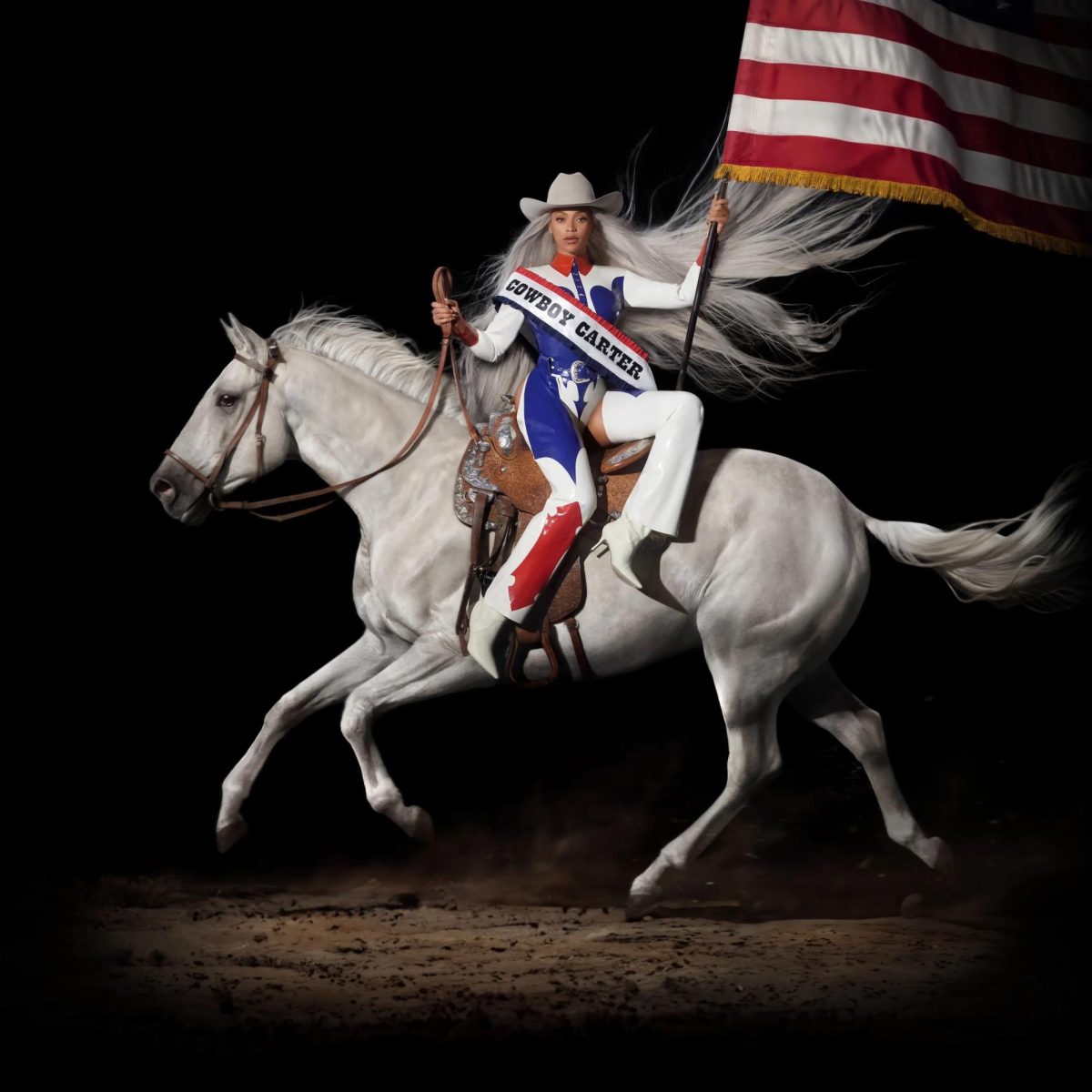Global popstar Beyoncé released her highly-anticipated album, “Cowboy Carter” on March 29, less than two years after her blockbuster platinum-selling record, “Renaissance,” which won four Grammy Awards. In a Verizon Super Bowl commercial starring the musician and American actor Tony Hale, the singer proclaims, “Okay, they ready. Drop the new music!”
Moments after the advertisement aired, Beyoncé surprise-released “Texas Hold ‘Em” and “16 Carriages,” an up-tempo country track and a country ballad, respectively. The two tracks became top 40 hits on the Billboard Hot 100 chart, with the former later topping the chart, as well as the Billboard U.S. Hot Country Songs chart, making Beyoncé the first Black woman ever to do so.
The dual lead singles were not Beyoncé’s first effort at producing country music, as she first approached the genre with “Daddy Lessons” from her album “Lemonade” — a track she notably performed at the 2016 CMAs with The Chicks. Since the performance, Beyoncé was ridiculed by white, conservative country music fans and artists, despite other pop acts crossing over to the genre over the years. Evidently, the concern was not due to Beyoncé being associated with a different genre, but rather a racially-driven fury.
What most people do not realize is that the Houston, Texas-born musician has always been embedded in cowboy culture. Beyoncé also performed at the Houston Rodeo multiple times throughout her career and released a “Rodeo” collection for her Ivy Park x Adidas clothing line. To question her validity to create country music is preposterous, as country music knows no bounds, especially given Beyoncé’s background as a Black Southern woman.
In a statement via Beyoncé’s Instagram account, the artist stated that “Cowboy Carter” follows the continuation of “Renaissance,” making it Act II of the album trilogy. Its album cover is similar to its prequel, once again featuring Beyoncé on a horse. This time, she rides a galloping white stallion as she dons a pageant sash of the album title — she is also holding the American flag and dressed in its colors.
The superstar chronicles — following the aftermath of the 2016 CMA performance in which she “did not feel welcomed” — that she “did a deeper dive into the history of Country music and studied our rich musical archive.” The statement ends with “This ain’t a Country album. This is a ‘Beyoncé’ album,” apprising listeners ahead of the album’s direction.
“Genres are a funny little concept, aren’t they? Yes, they are,” country pioneer Linda Martell exclaimed on “Spaghettii,” the 12th track on “Cowboy Carter.” “In theory, they gave a simple definition that’s easy to understand. But in practice, well, some may feel confined.” “Cowboy Carter” is a smorgasbord of genres, taking listeners on an audio rollercoaster and several celebrity guest appearances. The album is structured to mimic a radio station, with several spoken interludes throughout.
The cinematic and orchestra-heavy song follows Beyoncé’s violent fantasies and her awareness that she is her father’s child.
The opening track, “Ameriican Requiem,” reminds me of a psychedelic version of Queen’s “Bohemian Rhapsody.” “Got folks down in Galveston, rooted in Louisiana/Used to say I spoke, ‘Too country’/And then the rejection came, said I wasn’t country enough,” she sings as she questions the public’s perception of her Southern origins.
The following track, “Blackbiird,” is a cover of The Beatles song “Blackbird,” written by Paul McCartney in response to the Civil Rights Movement, and particularly to the Little Rock Nine — the enrollment of nine Black students at Little Rock Central High School in 1957. It features Brittney Spencer, Reyna Roberts, Tanner Adell and Tiera Kennedy, all rising Black country stars. I find it heartwarming that Beyoncé is utilizing her status as a famous music star and helping out the careers of future stars, especially on a hopeful song.
Similar to how “Renaissance” was dedicated to Beyoncé’s late Uncle Johnny, the family affair continues on “Cowboy Carter.” The album’s fourth track, “Protector,” features Beyoncé’s youngest daughter Rumi Carter in its intro requesting for a lullaby to be sung, forefronting her maternal element and dedicating the song to her children. Beyoncé’s vulnerability continues on “Just For Fun,” a duet with up-and-coming country act Willie Jones. “Here’s to hoping I’ll fall fast asleep tonight/And I’ll just need to get through this,” she renders on the track acting as an intimate therapy session.
An essential career highlight is the record’s 11th track, “Daughter.” The cinematic and orchestra-heavy song follows Beyoncé’s violent fantasies and her awareness that she is her father’s child. An inclusion of the Italian opera song “Caro Mio Ben” is present, elevating the track’s drama, moving me on my first listen, as if I was being teleported to a Western film.
My personal standout on the record is the 26th track featuring Shaboozey, “Sweet Honey Buckiin,’” a musical trifecta with a fusion of western sounds, an acoustic and vocal heavy bit and Jersey club. “A-O-T-Y, I ain’t win/I ain’t stuntin’ ‘bout them,” she raps, in reference to the artist’s various snubs of the Grammy award of the same name. One of my favorite categories of songs are ones with spontaneous beat-switches, as this one fits right in and never ceases to amaze me.
Beyoncé honors those who came before her, acknowledges the current state of music and the world, and foreshadows the future by platforming rising stars that will later take on the music world. The versatility she displays on “Cowboy Carter” amplifies her force as one of the greatest musicians in music history — she helps shift the vision of country music, proving that Black artists belong in the genre and have the right to embrace Western culture and reclaim the genre.

